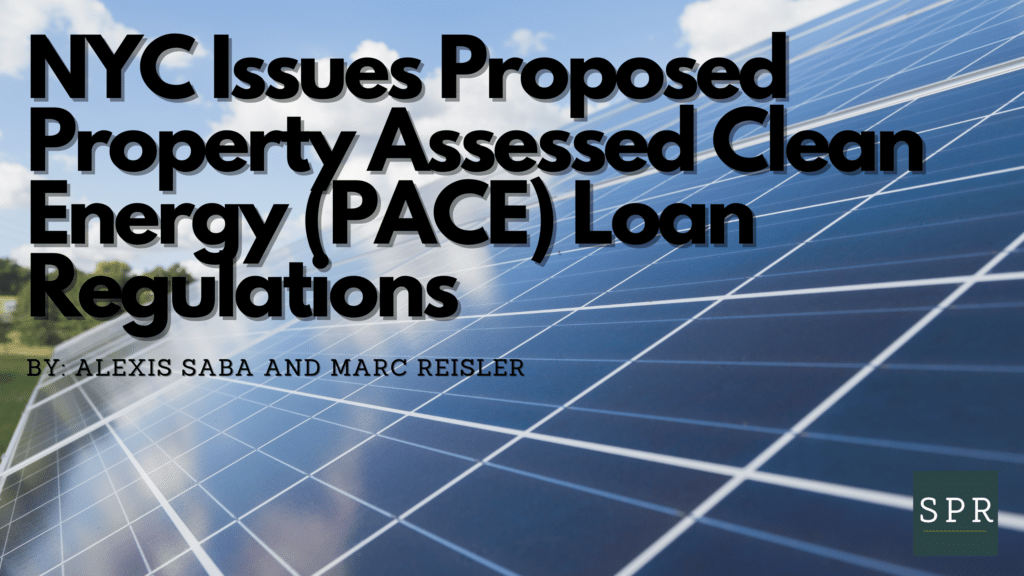Blog

NYC Issues Proposed Property Assessed Clean Energy (PACE) Loan Regulations
In late October 2020, the New York City Department of Finance issued proposed regulations to implement a Property Assessed Clean Energy (“PACE”) loan program in NYC to provide targeted loans with favorable terms to building owners for installation of systems designed to reduce energy use and carbon emissions. The deadline to submit comments on the proposed regulations is December 2, 2020. A public hearing will be held remotely on November 30, 2020. The Mayor’s Office of Sustainability plans to release additional guidance on the PACE loan program soon, with the expectation that financing will be available in early 2021.
To be eligible for a PACE loan, an applicant must: (1) be the fee owner of the property, provided that such owner does not owe any civil penalties, taxes or other debt to the City; (2) enter into a program financing agreement with a lender; and (3) comply with all project approval requirements and application requirements contained in the regulations and future guidelines.
Under the proposed regulations, building owners could apply for PACE loans from pre-qualified lenders (with the qualification process likely to be outlined in the City’s forthcoming guidance) for the following:
- The installation of energy efficiency improvements that are: (i) likely to result in savings in energy consumption, as determined by an energy audit; and (ii) demonstrated to be cost-effective according to criteria set forth in the City’s forthcoming PACE program guidelines.
- The installation of Renewable Energy Systems that are practicable, or otherwise feasible, as determined by a Renewable Energy System feasibility study. Note: the definition of “Renewable Energy Systems” in the proposed regulations is ambiguous as to the required location of the Systems. The term is defined as “an energy generating system for the generation of electric or thermal energy, to be used primarily at the real property where such system is installed, except when the owner of real property is a commercial entity, by means of a solar thermal, solar photovoltaic, wind, geothermal, anaerobic digester gas-to-electricity systems, fuel cell technologies, or other renewable energy technology approved by the Authority not including the combustion or pyrolysis of solid waste.”
- Conducting energy audits.
- Conducting Renewable Energy System feasibility studies.
- Verification of the installation of energy efficiency improvements and Renewable Energy Systems.
The proposed regulations include qualification requirements for energy audit providers and feasibility study providers.
A PACE loan remains with the underlying building and not the building owner. Payments due under PACE loans appear as separately listed charges on the property tax bills for the buildings benefited by such loans. Amounts due under PACE loans will be collected by New York City substantially in the way it collects other property taxes and assessments. Unpaid amounts under PACE loans become liens assessed on the underlying properties. PACE loan liens are senior to all other liens and mortgages on the underlying properties other than liens assessed for non-payment of New York City property taxes and other New York City assessments. Unlike conventional loans, if a building is transferred, the underlying PACE loan does not accelerate. Instead, amounts due under the PACE loan continue to be collected by New York City and become an obligation of the transferee of the underlying property.
There are numerous advantages of PACE loans over other types of financing: eligibility is primarily based on the equity value of the building, making the application and approval process easier; and PACE loans often have superior interest rates and loan maturities, making for smaller payments than traditional loans.
The proposed regulations implement Local Law 96, which the City Council passed as part of the 2019 NYC Climate Mobilization Act (“CMA”) with the goal of facilitating renewable energy development and energy efficiency upgrades. PACE could be a significant financial tool for building owners seeking to meet other CMA requirements, such as Local Law 97 greenhouse gas emissions caps, Local Law 92/94 solar and green roof installations, and Local Law 95 building energy grades.